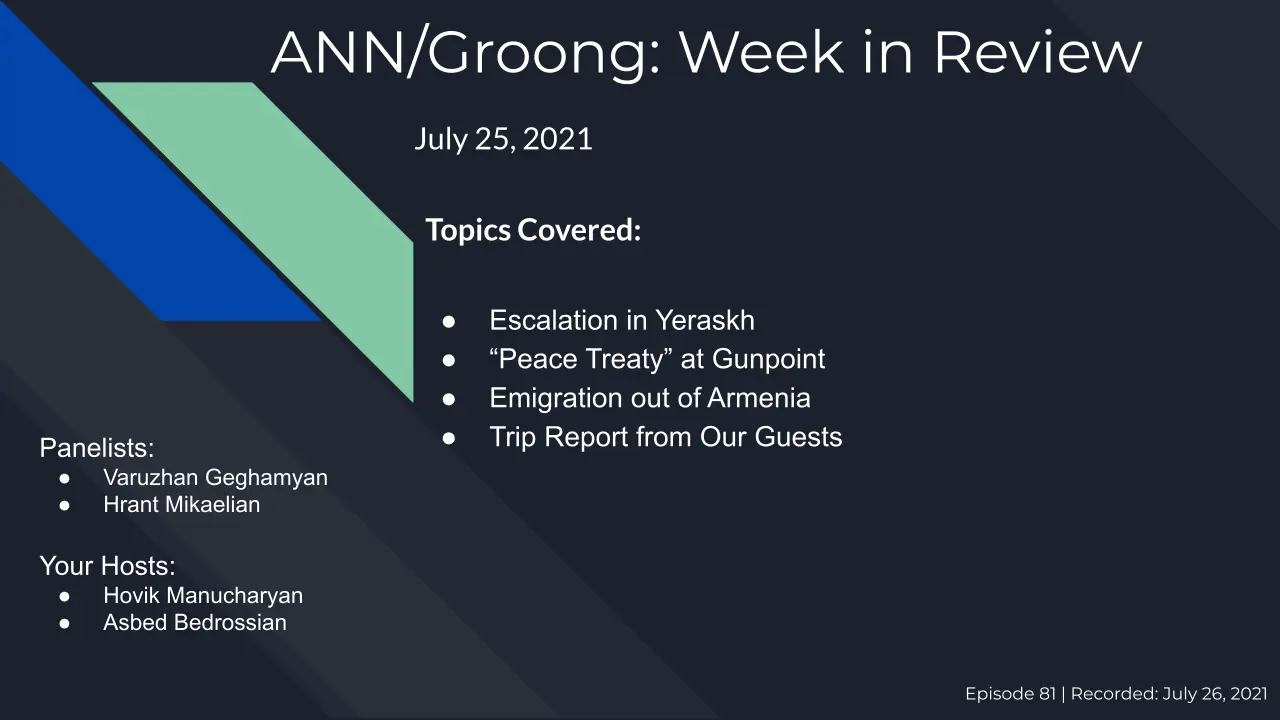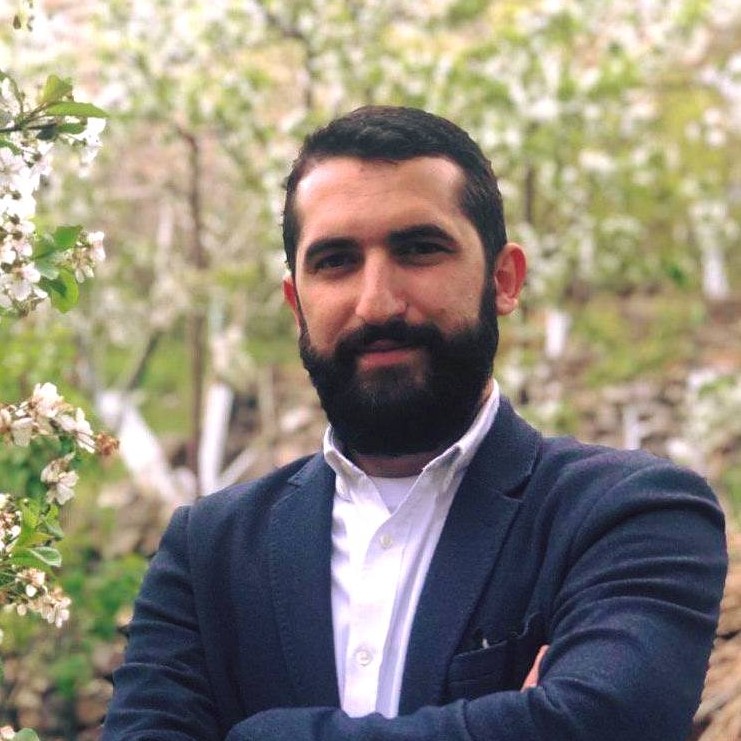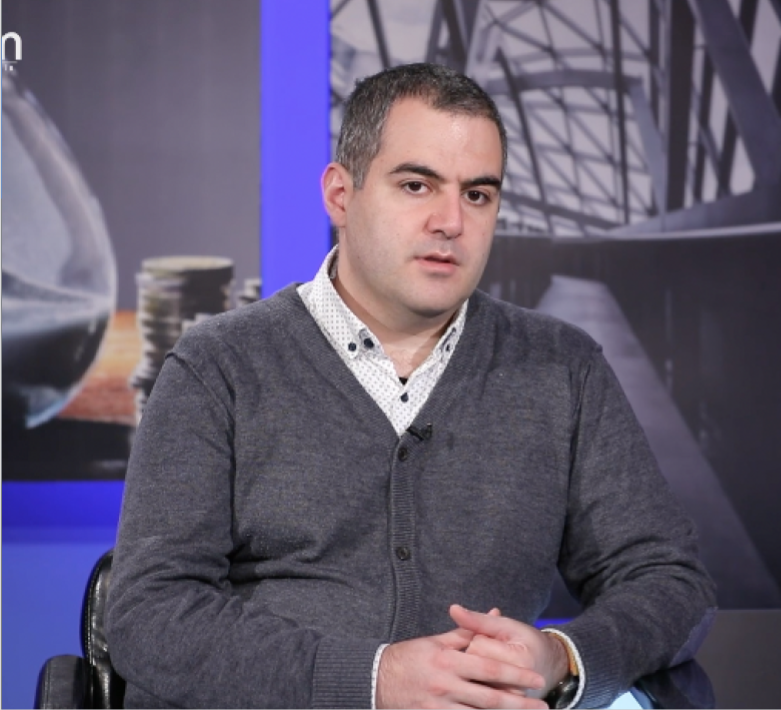Escalation in Yeraskh | Gunpoint Diplomacy | Emigration | Guest Trip Report | Ep. 81 - July 25, 2021 [EP81]
Posted on Tuesday, Jul 27, 2021 | Series: WIR
ANN/Groong Week in Review - July 25, 2021
Topics:
- Escalation in Yeraskh
- “Peace Treaty” at Gunpoint
- Emigration out of Armenia
- Trip Report from Our Guests
Guests:
Episode 81 | Recorded: July 26, 2021
Show Notes
Escalation in Yeraskh
Last week when the border instability around Yeraskh started and were heating up, Aliyev went to Moscow for a one on one meeting with Putin. The message that we read right before, during and after that meeting from the three OSCE Minsk group co-chairs was that “a lasting and comprehensive” peace needs to be hammered out. Aliyev returned to Baku and said that he had already solved the Artsakh issue, that other paths to peace would be “wrong and risky”. The news reported that Putin had told Aliyev to seek a compromise solution. Pashinyan has rejected that the Artsakh issue is resolved.
A quick note: the border shootings stopped soon after Aliyev’s trip to Moscow.
It appears that the west, the US and the EU, were waiting to see the outcome of Armenia’s June election results, because since then their diplomacy has activated. The European Commission has not pledged somewhere between 1.6 and 3.1 Billion Euros for Armenia in the coming 5 years. The US and the EU - particularly France, have pledged to find a lasting and sustainable peace in the region. Frankly, Russia is a bit of an odd man out right now.
Questions:
- Have the Russians been caught off-guard and a little weak at present in the South Caucasus?
- What are the calculations that are leading the West to bet on Armenia, and enabling additional communications paths to those mentioned in the November Agreement?
“Peace Treaty” at Gunpoint
The Armenia-Azerbaijan narrative has shifted from the Armenian POWs to the roaming border instabilities, most recently the shelling around the village of Yeraskh, just north of the Nakhijevan border, 68 km south of Yerevan.
This seems to be Azerbaijan’s strategy to keep Armenia under state-sponsored terror on the borders and keep the fear of the war restarting alive, in order to force Armenia into a peace treaty at gunpoint.
But as we discussed above, regional diplomacy is aligning against a premature so-called “peace treaty” that forces countries into winner and loser slots, and specifically, pre-determine the status of Artsakh.
Questions:
- What are Aliyev’s options?
- Is Ankara fully aligned with Azerbaijan on this?
Emigration out of Armenia
In a recent interview our guest today, Hrant said:
There are most probably 1,800,000-1,900,000 Armenians living in Russia. This is what political scientist Hrant Mikayelyan said in an interview with Armenian News-NEWS.am.
Moreover, according to him, based on the data of the 2010 census, there were 1,182,000 Armenians living in Russia.
“In addition, 600-650,000 of them are citizens of Armenia. At the same time, during this period, tens of thousands of Armenians have acquired Russian citizenship. So, it’s safe to say that there are almost 2,000,000 Armenians living in Russia,” Mikaelian clarified, noting that, according to the accepted evaluation, there are more Armenians living in Russia than in Armenia, even though this isn’t the case.
The political scientist went on to say that 138,000 people have left Armenia in the first half of this year and that this is a rather serious figure for the country.
“This is a rather serious indicator for Armenia. Out of those people, 80,000 will most probably never return to Armenia. This is an extremely large indicator for six months,” Mikaelian said.
According to the political scientist, most of the citizens who left Armenia have gone to Russia since the easiest route to take is the route to Russia during the coronavirus pandemic. “However, it should be mentioned that the Armenians don’t have a major position in Russia due to the decline in the level of relations between Russia and Armenia. There are simply Armenians who don’t want to see this,” Mikaelian said, adding that the reputation of Armenians and Armenia has seriously decreased in not only Russia, but also other parts of the world due to the defeat in the recent war.
Trip Report - Hrant and Varuzhan’s Trip to Russia
Varuzhan and Hrant discuss their recent trip through Russia, visiting many major cities, and meeting Armenian community leaders. They also held meetings with Russia’s political analyst and academic community.
Hrant shares his impressions of his recent visit through Artsakh.
Wrap-up
We hope you found our Week in Review helpful. We invite your feedback and your suggestions, you can find us on most social media and podcast platforms. Thanks to Laura Osborn for the music on our podcasts.
Guests

Varuzhan Geghamyan
Prof. Varuzhan Geghamyan is assistant professor at Yerevan State University’s Department of Oriental Studies, teaching courses on Turkey’s modern history, History of Azerbaijan; Sociocultural anthropology of Azerbaijan; Political ideologies and parties in Modern Turkey & History of the Turkish Republic.

Hrant Mikaelian
Hrant Mikaelian, a political scientist and multidisciplinary researcher in social sciences based in Yerevan. He is also a senior researcher at the Caucasus Institute. Hrant is a co-founder of the Armenian Project.
Hosts

Hovik Manucharyan
Hovik Manucharyan is an information security engineer who moved from Seattle to Armenia in 2022. He co-founded the ANN/Groong podcast in 2020 and has been a contributor to Groong News since the late 1990s.
Disclaimer: The views expressed by Hovik Manucharyan on the ANN/Groong podcast are his own and do not necessarily reflect the opinions of his employer or any other organization.

Asbed Bedrossian
Asbed Bedrossian is an IT professional, and for years oversaw the central IT enterprise infrastructure and services at USC. His decades of experience spanned across IT strategy, enterprise architecture, infrastructure, cybersecurity, enterprise applications, data center operations, high performance computing, ITSM, ITPM, and more.
Asbed founded the Armenian News Network Groong circa 1989/1990, and co-founded the ANN/Groong podcast in 2020.